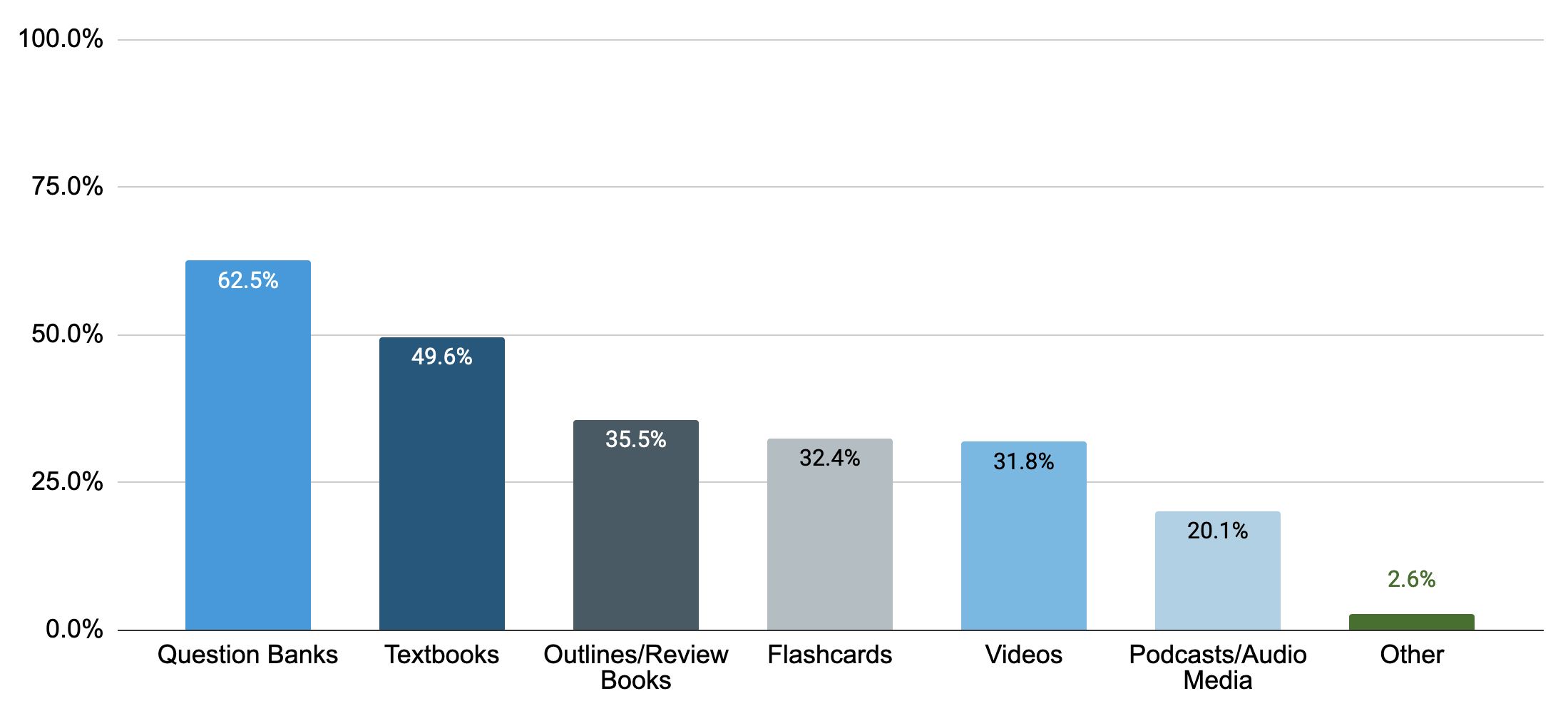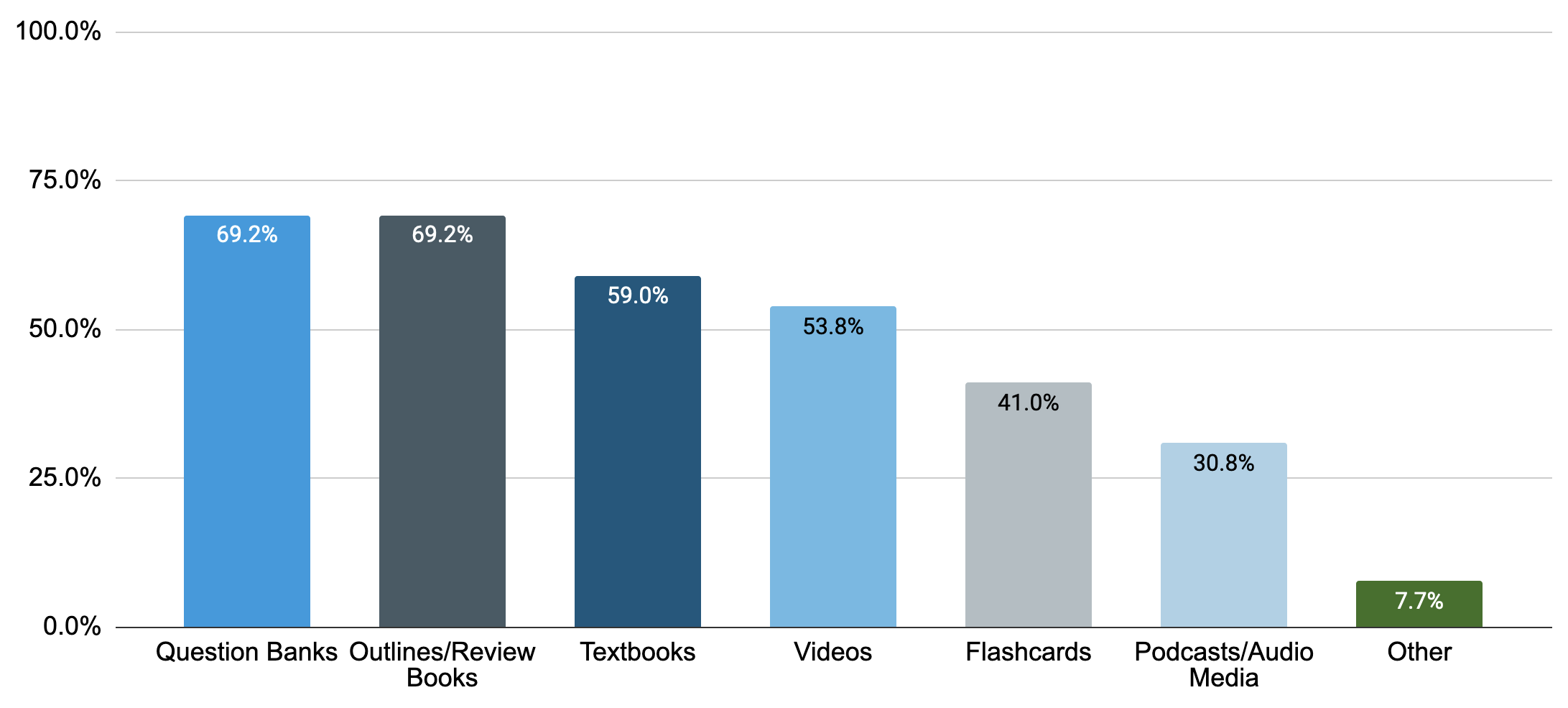Background
There are a wide variety of options for learning ophthalmology now. There are more textbooks and review books available now than ever before; podcasts, YouTube channels, and many other forms of media also provide new streams of innovative content.
Over the last 6-7 years since I started Ophthalmology Review, I’ve enjoyed trying different methods of developing useful content - from directly translating my notes from residency, to creating tables and picmonics, writing review articles, etc. - I’m constantly thinking of how to teach the incredible field of ophthalmology.
However, sometimes it’s hard to know exactly what people find most useful, and what may be helpful for one person may not be for another. So in my continuous search for content ideas, I wanted to know what study tools the readers of this website find most helpful.
Methods
For most of the downloadable study materials I offer on the website, I have a 2-question optional exit survey that people can fill out to provide me with some feedback about what tests they are preparing for and what types of study methods they personally prefer.
What test(s) are you studying for?
Ophthalmic Knowledge Assessment Program (OKAP)
Written Qualifying Exam (WQE)
Oral Board Exam (OBE)
International Council of Ophthalmology (ICO) Exam
Other (earlier iterations of the survey included Quarterly Questions as well as now-defunct American Board of Ophthalmology mid-cycle examinations)
What is/are your preferred method(s) of studying?
Textbooks
Outlines/Review Books
Question Banks
Flashcards
Podcasts/Audio Media
Videos
Other
This study is a survey of all resource downloads from 4/16/2018 to 2/28/2022.
Results
613 ‘orders’ were reviewed, with inclusion criteria being completion of at least one answer choice of the first survey question (“What test(s) are you studying for?”). Orders that did not have any answers selected were excluded from analysis. Orders that had answers selected for the first survey question but not the second were included in the descriptive analysis of the first question but excluded from further analysis of the second question (“What is/are your preferred method(s) of studying?”). There were no instances where no answers were provided for the first question but the second question was answered. Duplicates were also removed and defined as the same provided name/email for multiple orders on the same day. There were 518 unique orders with responses, and 439 unique orders that had answers for both questions.
What Are You Studying?
Of 518 responses, 338 (65.3%) reported studying for the OKAP. WQE, OBE, and ICO exams were not commonly reported (9.7%, 7.5%, and 11.4%, respectively). 121 (23.4%) reported studying for other tests (Figure 1).
Figure 1. Distribution of tests studied for by respondents (n=518).
How Do You Study?
Of 439 responses, 301 (68.6%) reported preferring question banks for study (Figure 2). Textbooks were also frequently reported (63.8%), with flashcards (35.8%) and podcasts/audio (23.5%) being the least used.
Figure 2. Distribution of preferred study methods (n=439).
Trends In Study Methods
OKAP
The top study methods preferred by respondents taking the OKAP were question banks (62.5%) and textbooks (49.6%) (Figure 3).
Figure 3. Proportion of study methods preferred by respondents preparing for the OKAP (n=349).
WQE
Of 51 responses, question banks and outlines/review books were tied for the most preferred methods of study (64.7%), followed closely by textbooks (60.8%) (Figure 4).
Figure 4. Proportion of study methods preferred by respondents preparing for the WQE (n=51).
OBE
Of 39 respondents, question banks and outlines/review books tied for most preferred study methods (69.2%), with textbooks (59.0%) and videos (53.8%) having a majority of respondents preferring to utilize these modalities (Figure 5).
Figure 5. Proportion of study methods preferred by respondents preparing for the OBE (n=39).
ICO
For the 63 respondents studying for the ICO exam, textbooks and outlines/review books were the most preferred study method (69.8% and 65.1%, respectively), with question banks (55.6%) and videos (54.0%) also being preferred by a majority of respondents (Figure 6).
Figure 6. Proportion of study methods preferred by respondents preparing for the ICO exam (n=63).
OTHER Tests
For the 125 respondents who were studying for other tests, textbooks were the most preferred study method (64.0%) (Figure 7).
Figure 7. Proportion of study methods preferred by respondents preparing for other exams (n=125).
Discussion
Preparing for an exam may require the use of multiple methods to both crystallize knowledge and optimize easy retrieval. There are various factors that influence the choice of method, including test format, personal preference, stage of training, and level of pre-existing knowledge.
Most of the survey respondents were studying for the OKAP, implying that the majority of individuals utilizing these study resources are in the early stages of training. In earlier stages of training, resources that emphasize frequent repetition and detailed explanations may be more beneficial than general summaries or passive study tools.
For most tests, question banks were the predominantly preferred study method. Question banks, which provide a rapid feedback mechanism for solidifying knowledge, are an excellent method for learning and review, especially when employed early in the learning process to short-circuit the “false fluency” that can arise from rereading the same text over and over again. Check out my review of Make It Stick: The Science of Successful Learning for more information.
Textbooks have historically been one of the major tools for learning and review. However, simply reading and re-reading textbooks has been shown to be an inefficient and relatively ineffective method of learning (see Make It Stick). However, textbooks are often more readily available than some other options, and intuitively many of us probably still lean on textbooks to build our knowledge. It is not surprising, then, to see that textbooks are the second-most frequently preferred method for studying. Textbooks are excellent sources of detailed explanations of concepts, which are not always available with question banks.
It was a little bit surprising to see flashcards listed fairly low for OKAP and WQE (they were preferred in 41% of OBE and ICO exams). Similar in some ways to question banks, flashcards are another excellent method of reviewing large volumes of information for rapid recall. Combined with spaced repetition algorithms, virtual flashcards such as Anki decks can be very helpful for self-studying content that simply has to be memorized.
Technology and the creative drive of many individuals has expanded the number of available study resources, far more than was available to me when I was going through residency. Podcasts, YouTube channels, and other media were present but not utilized for studying ophthalmology. I suspect that some of the lower proportions of responses for these study methods may be due to the relatively new nature of these methods, as well as the inherently more passive nature of these resources.
There are many flaws and unanswered questions as I look at this data. Preferences do not mean effectiveness, so just because the majority of respondents utilize question banks, textbooks, and outlines/review books, it does not necessarily follow that focusing on these three areas will result in more effective learning or test performance. The way I structured the survey questions also limits the analysis I can perform on the responses, so I can only report trends. The survey was also nonrandom and self-selected for a small cohort, so there are many limitations to the extent we can draw effective conclusions other than perceived interest in certain forms of study material.
Conclusion
Part of my intention with this survey was to gain insight into what resources may be most helpful to create; after all, what’s the point of spending hours crafting a lecture video or a study guide that no one finds useful? Based on the survey results, question banks, outlines, and videos may be the most beneficial resources I can create, while helping provide resources to maximize the benefits of textbook reading. If I have time, flashcards may also be helpful. Although I will continue to work on developing resources for all major ophthalmology exams, focusing on OKAP review may impact the most number of readers.
A huge thank you to everyone who responded; I hope this survey provides some interesting data that, while not super scientific, still gives you an idea of what your peers are doing to study.







